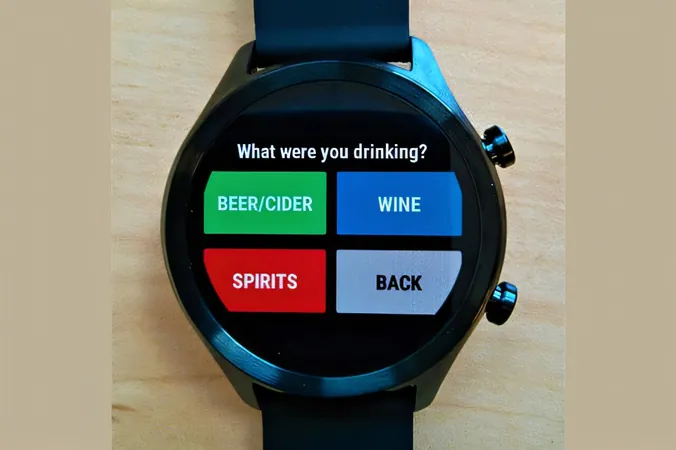
Revolutionary Smartwatch Study Paves the Way for Effective Alcohol Interventions!
2025-04-02
Author: Sarah
In a groundbreaking study led by the University of Bristol, researchers have shown that smartwatch technology could transform the way we monitor alcohol consumption, potentially saving the NHS England an estimated £3.5 billion annually—a staggering cost associated with alcohol-related harms. Alarmingly, 70 individuals lose their lives every day in the UK due to alcohol-related causes, highlighting an urgent need for innovative solutions in public health.
The research, published in the esteemed journal *JMIR Formative Research*, introduces a cutting-edge method known as micro Ecological Momentary Assessment (mEMA) through the AlcoWatch app. This new approach utilizes standard Android smartwatches to gather rich, real-time data on alcohol consumption, surpassing traditional methods like Timeline Followback (TLFB), which often suffer from accuracy problems due to users’ inability to recall details accurately days or weeks later.
In an effort to determine the feasibility and acceptance of this new technology, 32 participants from Bristol’s ongoing 'Children of the 90s' health study engaged with the AlcoWatch app over 12 weeks. They received prompts five times daily asking about their alcohol intake during the previous two hours. Participants also filled out bi-weekly online diaries using TLFB for comparison, which provided researchers with insightful feedback via semi-structured interviews at the study's conclusion.
Significantly, the findings indicated that participants displayed a higher engagement rate with the smartwatch-based AlcoWatch compared to the traditional diary method. This elevated engagement is critical as it reduces missing data, enhancing the accuracy and reliability of analyses related to drinking behaviors.
Interestingly, the study did reveal that participants from lower socioeconomic backgrounds engaged less with the AlcoWatch system. This presents a challenge that future research must address, as disparities in health intervention efficacy can widen existing inequalities.
Study lead Chris Stone, a Senior Research Associate at Bristol’s Tobacco and Alcohol Research Group, expressed optimism about the findings, stating, "Our study demonstrates that smartwatches have considerable potential for capturing data about alcohol drinking behavior in people's real-life environments."
In a broader context, Dr. Andy Skinner, a Senior Research Fellow in the Integrative Cancer Epidemiology Program, noted that this study builds on their previous work with smartwatches in smoking cessation, underscoring the potential for wearable technology to collect data across various health-related behaviors and develop meaningful interventions.
The research team advocates for additional studies to further explore user engagement—specifically focusing on comfort levels of smartwatches, battery life, and charging frequency. They aim to understand why engagement levels vary between socioeconomic groups, ensuring future interventions can be designed to effectively reach and support a diverse array of individuals.
As technology continuously evolves, the findings from the AlcoWatch study may usher in a new era of public health strategy, harnessing the power of smartwatches to tackle the pressing issue of alcohol misuse. Will we soon see a revolution in how we approach drinking habits through technology? Only time will tell!



 Brasil (PT)
Brasil (PT)
 Canada (EN)
Canada (EN)
 Chile (ES)
Chile (ES)
 Česko (CS)
Česko (CS)
 대한민국 (KO)
대한민국 (KO)
 España (ES)
España (ES)
 France (FR)
France (FR)
 Hong Kong (EN)
Hong Kong (EN)
 Italia (IT)
Italia (IT)
 日本 (JA)
日本 (JA)
 Magyarország (HU)
Magyarország (HU)
 Norge (NO)
Norge (NO)
 Polska (PL)
Polska (PL)
 Schweiz (DE)
Schweiz (DE)
 Singapore (EN)
Singapore (EN)
 Sverige (SV)
Sverige (SV)
 Suomi (FI)
Suomi (FI)
 Türkiye (TR)
Türkiye (TR)
 الإمارات العربية المتحدة (AR)
الإمارات العربية المتحدة (AR)